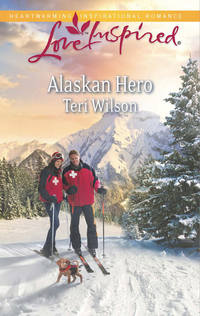
Полная версия
Alaskan Homecoming
But it had quickly become a labor of love. He’d always had an attachment to the pond, like most everything about Aurora. About Aurora itself.
When he’d landed here as a teen, he’d had enough of the nomadic lifestyle that came with being a circuit preacher’s kid. Enough of moving from one village to the next, each one somehow seemingly more and more remote. Enough of being a guest in other people’s homes instead of sleeping in a bed of his own.
And enough of planes. Planes, planes and more planes. The smell of airplane fuel still made him feel a little sick inside.
He’d wanted a home. A town. A place that was his.
He’d told his parents as much the day they’d unpacked their bags in Aurora. He was staying put. He wanted to make friends, go to a regular school, try out for the baseball team...do all the things normal kids did. He’d seen virtually nothing of the town yet. Just the tree...that fateful tree. Stretching its beautiful blue, snow-laden boughs over everything. Welcoming arms.
His mom and dad had prayed about his announcement, discussed it for days on end. Finally, they’d agreed to buy a house and stay put for three years. Just until he graduated from high school. His dad would come and go as his job required, but Liam, his mother and his brother would stay right there in Aurora.
Liam had been elated. He’d thrown himself into life in Aurora. He’d loved that town. And it had loved him right back. And in time, Aurora—its people, its icicle air, its permafrost ground—had become home.
And now he owned a piece of that town. A piece of its heart. At times, he couldn’t believe it. Then something would happen. The temperature would drop suddenly, and the surface of the ice would crack. Or they’d get an unexpected heavy rain, a layer of shale ice would cover the pond, and he’d have to scrape the entire surface. Undoubtedly, Liam would be reminded that he was indeed the owner and operator of an outdoor skating rink.
“No more chips. Everything looks good.” Alec stepped off the ice and tossed the empty bucket into the snow.
Liam wound the hose and turned the water faucet until it was just shy of the off position. A fraction of an inch could make the difference between being stuck with frozen pipes and maintaining his sanity. “Thanks, man. I appreciate the help. There’s never a shortage of things to do around here.”
“No problem.” Alec grinned in Ronnie’s direction. “With any luck, your boy over there will keep getting in trouble, and you’ll have so much help you won’t know what to do with all of your free time.”
Sundog flopped on his back and shimmied in the snow, sending a wave of powder flying ten feet. In two seconds flat, Liam was buried up to his shins. “Bored? Doubtful.”
“Pastor? Pastor!” Ronnie called from midway across the ice. He skidded toward the edge while juggling his empty red bucket.
“Don’t look now, but that trouble I mentioned is about to rear its ugly head,” Alec muttered under his breath.
The crunch of tires on snow caused Liam to turn around, and when he saw the familiar silver truck, he knew at once why Ronnie was in such a hurry to get off the ice.
He turned back around, and sure enough, Ronnie stood before him, red-faced from exertion, scowling at Melody’s truck. “What’s she doing here?”
Liam inhaled calmly. “Melody practices here sometimes before the pond opens up for the night. You know that.”
Ronnie rolled his eyes. “She thinks she’s going to be a real skater one day. Please.”
“She already is a real skater.” Graceful. Almost balletic. Sometimes it was like watching a memory glide over the frosted mirror surface of the ice. “Why don’t you stick around while she skates? I think you’ll be impressed.”
Ronnie looked at Liam in abject horror. “No. Way.”
Behind his back, Alec stifled a grin.
“Ronnie.” Liam lifted a brow. A warning.
“I mean no, thanks.” Ronnie shoved his hands in his pockets and looked everywhere except in the direction of the truck, where Melody was climbing down from the passenger seat, her skates slung over her shoulder by their laces. “I’ve got homework.”
Sure he did.
“All right. I’ll see you tomorrow after school, then,” Liam said.
“See you, Pastor.” Ronnie trudged toward his rust bucket of a car.
Liam called after him, “Thanks for the help fixing the ice.”
Ronnie waved, steadfastly avoiding Melody’s gaze as she walked past him. Once he’d just about reached his car, he turned slightly. He ventured a glance at Melody right as she looked at him over her shoulder. She smiled. He smiled in return, then seemed to realize what he was doing. He scowled. She scowled back and stomped toward a bench to sit and put on her skates.
“What did I tell you?” Alec muttered. “Young love. It’s a classic case.”
Liam’s gut tightened. Alec was right. How had he not seen it before? The two of them were about as subtle as a moose in striped pajamas.
Then again, what had Liam ever known about love?
* * *
Posy had never felt so exhausted and yet so awake at the same time. Three hours and four cups of coffee after arriving at the Northern Lights Inn, she finally left and headed to her parents’ house.
Her house. At least she still thought of it as her house, even though she hadn’t darkened its door in seven years.
Six. Not seven.
She wanted to strangle Liam. She kept thinking about him sitting beside her, across from Lou, making his case for why she shouldn’t be teaching ballet at the church.
I’m just not sure ballet is the answer. Posy hasn’t set foot in Alaska in seven years.
It wasn’t a crime. People were allowed to leave home. It was normal. Natural. Liam just felt differently about it because of the way he’d been brought up, always moving from place to place. Home was a sacred concept to Liam. Aurora was sacred.
The town was sacred to her, too. Didn’t he understand that?
How could he possibly when you left and never looked back?
She slid her key into the lock on the front door, but it was unnecessary. The knob turned and the door fell open, just as it always had. There were no such things as locked doors in Aurora. Just one of the many differences between a tiny Alaskan town and a big city like San Francisco.
She pocketed her key ring and stepped over the threshold. The interior of the house was dark, and she breathed a sigh of relief. She’d intentionally stayed out later than originally planned. After everything that had transpired at the church, she just wasn’t up to seeing her parents. Not yet.
“Posy?” a voice called from the darkened living room. “Is that you?”
So much for avoidance.
“Yes, it’s me, Mom.” She limped into the living room, dragging her rolling suitcase behind her. The television, a huge flat-screen Posy had never seen before, flickered quietly in the dark. “What are you doing awake this time of night?”
Her parents went to bed after the ten o’clock news every night. They watched the weather report, kept up with what was happening in Anchorage and headed to bed right after her dad’s favorite feature—the daily moose-sighting report, wherein viewers submitted photos of moose out and about town. Her dad held the record in Aurora for the most moose photos ever shown on the local news. Posy had sent him a new smartphone with a good-quality camera feature to replace his ancient flip phone for his birthday after she’d had her first three months’ pay as a professional dancer under her belt. He’d been ecstatic.
“What am I doing awake?” Her mother crossed the living room and gave her a tight hug. For some reason, it felt less comforting than the embraces of her girlfriends. More suffocating. “Waiting for you, of course. Your father headed to bed a little before ten, though. He has an early day tomorrow.”
“How early? He went to bed before the moose report?”
“Oh, honey. They don’t do the moose report anymore. They haven’t for a few years now.” Her mother released her. She smiled, and even in the dim light of the silent television, Posy could see lines around her eyes that hadn’t been there before.
“Oh. Wow. I had no idea.” The demise of the moose report struck her as profoundly sad, which was silly, really.
She probably just needed sleep. She’d had an early-morning four-hour flight to Anchorage, followed by her commuter flight to Aurora. Then the church, followed by the coffee date. It was a tribute to the power of Alaska’s finest caffeine that she could still hold her head up.
“People were getting carried away. They decided it was dangerous when Ed Candy from the dry cleaners got trampled and broke his foot while he was chasing a moose into the hospital with a camera.”
The hospital? Trampled?
First Liam’s crazy dog, now the moose. The animals had gone crazy since she’d been away. Although she could sympathize with poor Ed Candy’s broken foot.
Posy’s foot throbbed with pain. She’d probably been up and about too much today. She needed to lie down and get it elevated. She needed an ice pack. She needed an Advil. Desperately.
Don’t go there.
As if she were reading her mind, Posy’s mother asked, “Can I get you anything?”
“Mom, you don’t have to wait on me. This is my home, too.” Posy forced herself to smile, even though she suddenly felt like crying.
She would not cry. Not now. She shouldn’t feel sad. She should feel mad.
She pretended she was onstage and rearranged her features in a mask of neutrality. “I need to talk to you about something.”
“Oh?” Her mom’s gaze flitted about the room, which told Posy she knew perfectly well what was coming. “It’s awfully late. You said so yourself. We can talk in the morning.” She extended a hand toward Posy’s suitcase.
Posy wheeled it out of reach. “No. I want to talk about it now.”
“Okay. Sit down, sit down.” Her mom patted the sofa cushions and then took a seat opposite in the chair where her dad used to sit when he watched the moose report. Who knew where he sat these days?
Posy obediently sat sideways on the sofa and propped her foot up on a throw pillow. She wondered how long it was going to take before one of them finally mentioned her injury. “Mom, I appreciate your talking to Lou and getting things in order for me to work at the church, but...”
Tears stung the backs of her eyes again. Why was this so hard to say? She had every right to be upset. But sitting across from her mother, looking at her face—at the new lines around her eyes and the worry in her gaze—her indignation began to slip away.
She should have visited more. She hadn’t even come home for Christmas. Not that she ever would have been able to take leave of the ballet company during the holidays. The weeks that stretched from the end of October to New Year’s Day made up Nutcracker season. Everyone knew as much.
“I wish you would have told me that Liam was the youth pastor,” she finally said.
Her mom sighed. “I’m sorry. I just thought...”
“You thought you could have him spy on me. To make sure I’m not taking any pills. Right?” Her throat burned. It hurt to say the words aloud, but someone had to.
“Posy.” The lines around her mother’s face deepened.
“Mom, admit it. Please.”
Her mom took a deep breath, and she seemed to wilt a little on the exhalation. “That’s part of it, yes. But try to understand. Other than the handful of times we’ve been to California to watch you dance, your father and I haven’t seen you in seven years.”
“Six,” Posy began to whisper, but the word died on her tongue.
“After what happened last time, we wanted you here. At home, where you belong.”
Is this where I belong, God?
She didn’t bother waiting for an answer.
This was her home, but no, it wasn’t where she belonged. Not really. She was just here because she was hurt. She belonged onstage. Her foot belonged in a ballet shoe, not the ugly plaster where it currently resided.
“It’s not like the last time, Mom. I promise.”
Her mother nodded. She didn’t believe her. She might want to, but she didn’t. That much was obvious. And Posy wasn’t altogether sure she blamed her.
God, why is this all so hard?
Posy glanced up at the ceiling. But instead of finding God, all she could imagine were the snow-laden boughs of the giant blue evergreen spread over the town like angels’ wings.
Chapter Five
The next afternoon at the church, Posy scrolled through the playlists on her iPod, checking one last time to make sure she had the music she needed for barre work. Classical, of course.
For as long as she could remember, her barre exercises had been performed to classical piano. Sharp, staccato notes, perfect for the seemingly endless repetition of pliés, elevés, tendus and battements.
When she’d been a little girl in Madame Sylvie’s ballet school, the one and only in Aurora, the music had drifted from an ancient turntable—blue, the kind that could be closed like a suitcase. On it spun scratchy vinyl record albums with cardboard covers on the verge of deterioration that had been used by generations of dancers.
Posy turned the iPod over in her hand, wondering what had become of that turntable and those albums. Madame Sylvie had suffered a sudden heart attack only three months after Posy had moved to San Francisco. In a single, tragic episode, both the ballet teacher and the school itself ceased to exist.
Posy had missed the funeral. She’d been dancing in her first real performance with the corps. Swan Lake, notorious for being the toughest ballet for corps dancers. It was the marathon of ballets. So while the woman who’d first taught her how to point her feet had been laid to rest, Posy had been fluttering across the stage in white feathers for three solid hours. By the end of the matinee that Saturday, her feet had hurt nearly as much as her heart.
Of all the things she’d missed in Aurora, Madame Sylvie’s funeral was the one Posy had been the most conflicted about. Ultimately, she’d stayed in California because it was what her teacher would have wanted. Dancing that afternoon was the best way to honor Madame Sylvie’s memory.
Posy had stitched a tiny black satin ribbon on the inside of her right pointe shoe in remembrance. And she’d danced until she no longer felt like crying.
A bittersweet smile came to Posy’s lips as she clicked the iPod in place in the docking station. She hadn’t thought about Madame Sylvie in a long time. Years maybe. This town was so full of memories, she was beginning to wonder if her heart had room for all of them.
And of course, just as she was feeling particularly wistful, the biggest memory of them all walked into the room.
“How’s it going in here? Do you need any help?” Liam stood with his hands on his hips and looked around at the metal folding chairs lined up in neat rows up and down the length of the fellowship hall. “What are all the chairs for? I thought the girls were going to be dancing.”
“The chairs are makeshift barres, for balance.” Posy would have loved some full-length mirrors, like every actual ballet school had. But this wasn’t a ballet school. It was a church. And anyway, this situation was temporary.
“Oh,” Liam said, crossing his arms and scowling, clearly disappointed. As if she’d given up on teaching the girls ballet before they’d even started. “Well, do you need anything else?”
He glanced at the iPod in her hand, at the dance bag overflowing with tattered pointe shoes sitting at her feet and then at the chairs again. Was it Posy’s imagination, or was he looking everywhere but at her injured foot?
It was the big, plaster-clad elephant in the room. She should have been relieved not to have to talk about it. But instead it irritated her that he was so painstakingly avoiding the topic. Then the fact that it irritated her just irritated her further.
Конец ознакомительного фрагмента.
Текст предоставлен ООО «ЛитРес».
Прочитайте эту книгу целиком, купив полную легальную версию на ЛитРес.
Безопасно оплатить книгу можно банковской картой Visa, MasterCard, Maestro, со счета мобильного телефона, с платежного терминала, в салоне МТС или Связной, через PayPal, WebMoney, Яндекс.Деньги, QIWI Кошелек, бонусными картами или другим удобным Вам способом.











